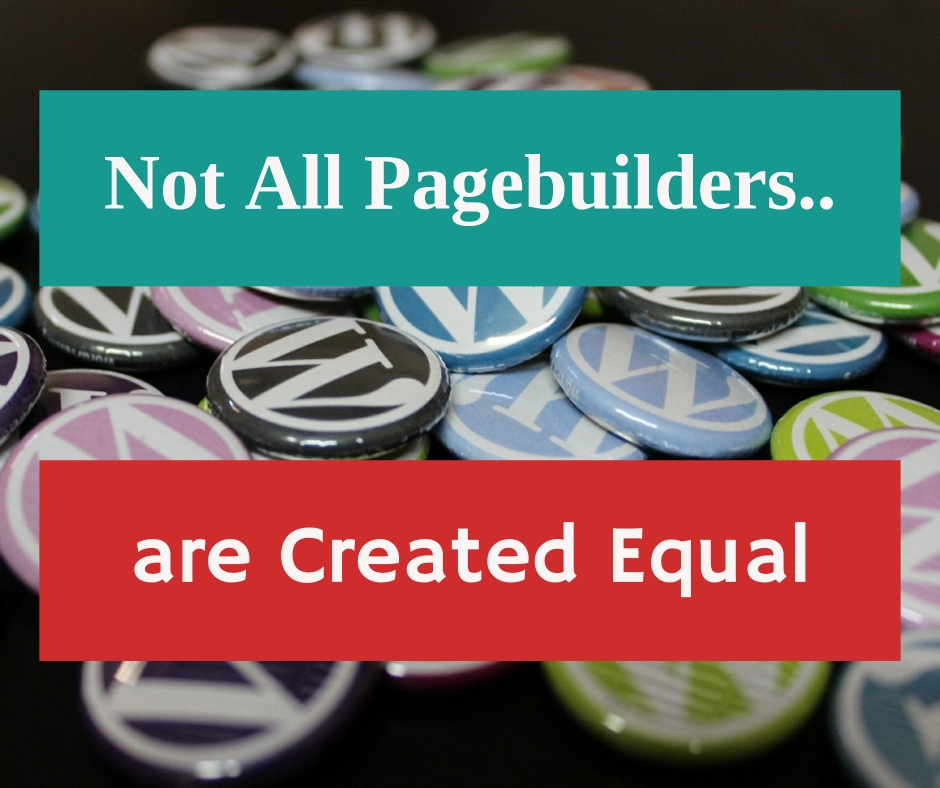Everything You Always Wanted To Know About PageBuilders (But Were Afraid to Ask)
Written by @Ympker and @vyas, 28 May 2020
Article was migrated from WordPress to Vanilla in March 2022

This is the first in the PageBuilder series guest-written by Forum members @ympker and @vyas
Please be sure to leave a comment thanking them for the time they have put into this series, I have had the pleasure of previewing the whole series and it is very large and comprehensive.
Part I: Introduction
The title, in case you were wondering, is a play on words on a movie by Woody Allen. And as the title suggests, this post is an introduction to the world of Pagebuilders. It is also the first of a multi-part series on pagebuilders that I have written in collaboration with @Ympker. The idea behind this initiative is to pool our experiences together and create a reference of sorts for the LowEndSpirit community. Lets' call this an original content for LES.

Image: Pixabay
Some of the posts in this series will focus on one or more available tools for a given category of pagebuilders. Others would be more generic in nature, and provide an overview of a particular tool or category. Without further delay, lets' dive into the topic right away.
So you are interested in knowing more about Pagebuilders, Eh?
If you look up discussions on sites like Quora, you would be inclined to believe that page builders exist for one type of Content Management System: Wordpress. This perception might be mostly true. Indeed, the majority of page builders exist for this most commonly used content management platform. But if we look at the Universe of web hosting, or its subset, Content Management Systems, you will realize that page builders cover a much wider territory.
What is a Pagebuilder Anyway?
In a nutshell, a page builder is a visual tool, which will help in creating web pages. The most common names that come to mind are:
- Site builders offered by Squarespace or Wix or
- add-ons or plugins for WordPress, such as elementor, Divi and Brizy.
But the story does not end there. Over the years, I have even used some pagebuilders, without realizing what I was using. Here's an example:
Remember this Logo?
Hint
 Image: Pinterest
Image: Pinterest
or
Another Hint
 Image: Betaarchive
Image: Betaarchive
if you are not prone to getting too nostalgic, Wikipedia has a great list of HTML editors that I believe were the pre-cursors to today's website creation tools. You may be familiar with some of them: Bluefish, Google Web Designer, Dreamweaver, and Seamonkey.
Okay, but...who uses Pagebuilders Anyway?
This category of web design tools caters to two sets of audience. One category is people who are not comfortable with or familiar with coding. Particularly with the rise in the no-code movement, the usage of such drag and drop tools has gained popularity.
The second is website designers and digital agencies, who would rather focus on customizing the websites for speed, security, efficiency, and so on. For them, the ability to utilize existing tools helps them utilize their time more efficiently, which ultimately has a bearing on the cost.
What are the advantages and limitations of Pagebuilders?
Advantages
One of the biggest advantages of using pagebuilders is they speed up the creation of pages. Flexibility, responsive. Many pagebuilders come with inbuilt image search, codes for embed players, etc. This really adds to their appeal. In addition, there are features for greater user engagement, such as surveys, forms, etc.
Disadvantages or Limitations
Now we move to the disadvantages. First of all, you're relying on third-party systems, many of which involve creating an account and entering payment information. For poorly designed or maintained systems, this could lead to security issues. Next, depending on the pricing plan, the scope of customization may be limited. A lot of providers offer free subscription plans, but they come with many limitations.
The level of control a user may have on the layout, features, etc. may be limited. In addition, many of these applications use closed source or proprietary software. This makes the user dependent on the provider for updates, security patches, and so on. Which is exactly the game some providers play.
As you will read in some of our subsequent posts, many of the Freemium models offer paid annual subscriptions. In other words, if you end the subscription, you are no longer able to use the service. Worse, you might be stuck with an older, unpatched version of the software.
Are All Pagebuilders Created Equal?
The short answer is no.

Image: A VYas
For the sake of simplicity, I would like to classify pagebuilders into six categories:
1.The Big Boys These services are commercially available to a very wide group of audience, and have a large user base. These large web hosts offer web hosting and have custom web builders. Examples include Squarespace, Wix, Weebly, Jimdo.
- The Rising Stars These cater to a smaller audience base. Examples of such service providers include (Carrd.co, Tilda.cc, Bookmark, Epicpixls, Voog).
- Page builders offered by hosting companies such as GoDaddy, Namechaep, Dynadot, etc. are also included in this list. The pagebuilder offered by Softaculous (Sitepad) also features in this list. Installtron or Cloudron might also offer similar applications.
4.Desktop apps such as Mobirise, 8b.
5.Pagebuilders for Wordpress As mentioned in the first half of this post, there are numerous options for pagebuilders for Wordpress . Examples include Elementor, Divi, Brizy. We will cover some of these in detail in a subsequent post.
6.Landing page creators This is the broadest category in our list, and can include mailing list; video hosting; and CRM services. Some of the examples in this list include Mailchimp, Hippovideo, Hubspot, and builder.io.
Bookmark.com 
Intrigued (or confused) enough?
Don't worry, we will cover the above categories in sufficient detail in the following posts. We hope this will help you clear the air on the topic of pagebuilders.
How This Series is Structured
Most blogs, tutorials, and review sites cover the "Big Boys" in sufficient depth, therefore we will not talk about them in this series. We will also not cover the pagebuilders offered by hosting companies for similar reasons. We may, however, include a short review of Softaculous in the last part of this series.
The subsequent posts will be as follows:
Part II : Pagebuilders: The Rising Stars
Part III : Pagebuilders: Desktop App
Part IV: Pagebuilders for WordPress - Part I
Part V: Pagebuilders for WordPress- part II
Part VI: Landing Page Creators (This will also be the concluding part of this series)
Note from @ympker about this project
So, the other day @vyas asked me if I wanted to collaborate on a joint-post about various Page Builders with him. Given that I have used a bunch of different page builders already, I thought this might be a nice little addition to our forum.
I will give you guys a short summary of my experience with:
-Divi (ElegantThemes; WordPress),
-Mobirise (HTML&CSS + Bootstrap Pagebuilder),
-Architect (HTML&CSS Pagebuilder) and
-Pinegrow (HTML&CSS + Bootstrap, Foundation and WordPress Theme Maker Addon).
All of these are great Pagebuilders and I appreciate them for what they are. Like with many things in life, I wouldn't call any of them perfect. I'm still waiting for the Ultimate Pagebuilder that unites all of my favourite features of these in one Pagebuilder but I guess that's not gonna happen. Anyway, I will try to give you an insight on what you can expect from each of the Pagebuilders I mentioned and perhaps get a better idea of which Pagebuilder might be suitable for your project.

Screenshot of Brizy Pagebuilder by A Vyas



Comments
Thanks for the article! Can't wait for part 3
Well written, and educational.
With some injustice towards the Dreamweaver!
🔧 BikeGremlin guides & resources
Need fully managed up to 20 ok?
HS4LIFE (+ (* 3 4) (* 5 6))
Excited to read the remaining bits!
Nexus Bytes Ryzen Powered NVMe VPS | NYC|Miami|LA|London|Netherlands| Singapore|Tokyo
Storage VPS | LiteSpeed Powered Web Hosting + SSH access | Switcher Special |
Thanks, guys!
Amitz, a very stable genius (it's true!) and Grand Rectumfier of the official LESLOS® (LES League of Shitposters).
Certified braindead since 1974 and still perfectly happy.